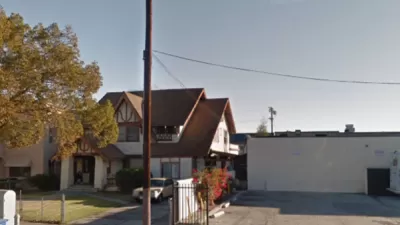For decades, many U,S, neighborhoods successfully resisted change at the expense of a few neighborhoods sacrificed to mass development. Is there a better way?

In a piece for Strong Towns, Charles Marohn calls for a new “housing bargain,” arguing that the pattern of housing development in American cities that has been accepted for decades is no longer working.
For Marohn, the “unspoken grand bargain” of U.S. development has been that “No neighborhood needs to change; they can all stay in their current form, but in exchange, one or two neighborhoods will experience radical transformation.”
This sacrificing of some neighborhoods for the sake of others perpetuates inequities and harms all types of neighborhoods. “The neighborhoods that avoid change aren’t static; they’re slowly declining. Costs keep increasing. The tax base does not. The lack of incremental adaptation means that they’re becoming less financially productive, more expensive to maintain and increasingly fragile.”
On the other side, neighborhoods that do experience transformation also see rising costs, displacement, and predatory practices.
Marohn proposes a new bargain: “Every neighborhood needs to experience a bit of change; they all need to evolve and mature, but no neighborhood should experience radical change.” By recognizing that change is inevitable, this approach allows for incremental, organic growth. According to Marohn, “For places to make this change, a conversation needs to happen at the community level. Residents need to understand that a neighborhood evolving over time is not something to fear but something to embrace. It’s the only way to ensure that our cities remain vibrant, adaptable and accessible to everyone.”
FULL STORY: America’s “Grand Housing Bargain” Is Broken. It’s Time for a New One.

Trump Administration Could Effectively End Housing Voucher Program
Federal officials are eyeing major cuts to the Section 8 program that helps millions of low-income households pay rent.

Planetizen Federal Action Tracker
A weekly monitor of how Trump’s orders and actions are impacting planners and planning in America.

The 120 Year Old Tiny Home Villages That Sheltered San Francisco’s Earthquake Refugees
More than a century ago, San Francisco mobilized to house thousands of residents displaced by the 1906 earthquake. Could their strategy offer a model for the present?

HSR Reaches Key Settlement in Northern California City
The state’s high-speed rail authority reached an agreement with Millbrae, a key city on the train’s proposed route to San Francisco.

Washington State Legislature Passes Parking Reform Bill
A bill that would limit parking requirements for new developments is headed to the governor’s desk.

Missouri Law Would Ban Protections for Housing Voucher Users
A state law seeks to overturn source-of-income discrimination bans passed by several Missouri cities.
Urban Design for Planners 1: Software Tools
This six-course series explores essential urban design concepts using open source software and equips planners with the tools they need to participate fully in the urban design process.
Planning for Universal Design
Learn the tools for implementing Universal Design in planning regulations.
Ada County Highway District
Clanton & Associates, Inc.
Jessamine County Fiscal Court
Institute for Housing and Urban Development Studies (IHS)
City of Grandview
Harvard GSD Executive Education
Toledo-Lucas County Plan Commissions
Salt Lake City
NYU Wagner Graduate School of Public Service





























